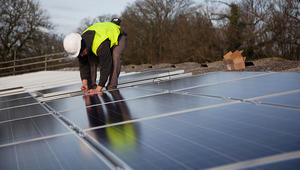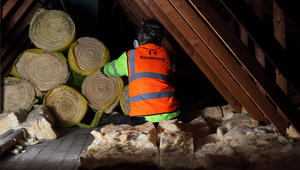A networking event to kick start low carbon projects in Leeds heard inspirational stories from trailblazing businesses about the multiple benefits of investing in energy efficiency and renewable energy.
Over 100 attendees from investment companies, financial services, consultancies and organisations gathered for the event on 1 May, which was presented by Leeds Climate Commission and hosted by Leeds Beckett University at Cloth Hall Court in Leeds.
Research led by the University of Leeds has identified a suite of profitable and cost effective opportunities for transitioning to a low carbon economy at the city scale (see the updated Mini Stern Report for Leeds). The Project Development and Finance Networking Event was the start of a facilitation process to take these forwards.
Following a welcome by Professor Chris Gorse of Leeds Beckett (above) Professor Andy Gouldson, Chair of Leeds Climate Commission, set out the aims of the event in his introduction.
Prof Gouldson stressed the need to connect up the opportunities with business models and finance arrangements to unlock investments and bring about “real change on the ground”.
“We are not here to be a talking shop – we recognise we need to engage and focus much more on climate finance,” he said introducing the Commission’s new initiative around project development and finance.
The initiative, chaired by David Kilduff, Head of Energy, Infrastructure and Government at Leeds law firm, Walker Morris, aims to connect organisations around Leeds and encourage collaborations and investment in low carbon projects with green finance. [Read David Kilduff’s article.]
Project level success stories
Leeds based businesses and organisations that are already realising the benefits of investing in low carbon measures shared their experiences in a series of brief presentations.
Louise O’Brien, Managing Director of Greyhound Box Ltd, spoke of the benefits for ISO 14000, reporting that, “Staff are happier, working practices are better, the environment has benefited and company profits have increased” [presentation link below].
Peter Vickers of long established Leeds company Vickers Oils, which makes lubricants for industry, demonstrated that even on old manufacturing sites, low carbon investments can have a measurable impact: 20 per cent of the energy used on site now comes from renewable energy (solar panels).
Philip Holdgate, Senior Production Accountant for ITV’s Emmerdale, presented a short film showcasing the significant sums the continuing drama has saved by investing in LED studio lighting and electric vehicles, among other measures.
The popular programme has also been sharing the low carbon message via subtle on-screen hints, while staff at the Kirkstall Road studios (which also includes the production team for Victoria, Calendar News and factual arm Shiver) have enthusiastically embraced Carbon Literacy training with BAFTA, leading to further environmental, economic and social benefits.
Project development and financing
The next part of the event focussed on the financing and development of projects, commencing with Richard Knight, Associate Director of Arup, who emphasised the importance of knowing what you want to achieve and understanding how your organisation uses energy, as well as getting decision makers involved at an early stage [presentation link below].
Speaking on options and opportunities around financing the transition, Nick Robins, Professor in Practice in Sustainable Finance at the Grantham Research Institute on Climate Change, said that while momentum on green finance is good, how it links with local development is a key issue.
There is currently an inadequate pipeline of green projects to meet demand from investors, he said, pointing to opportunities presented by local authority pension funds, green bonds and social investment products that help deliver a “just transition” [presentation link below].
Investors’ perspectives
Mike Dunn of Iona Capital confirmed the interest in circular economy and resource efficiency projects for boosting returns, making the ethical case for low carbon investment. Presenting graphs mapping temperature rise against carbon dioxide emissions, he analysed the amount of fossil fuels that could be burned to remain within the Paris Agreement on climate change, demonstrating that the future lies squarely with renewable energy.
Bruce Davis, a co-founder of investment platform Abundance (which created the UK’s first local authority, ISA linked solar bonds), also focussed on ethics and the popularity of investments with social returns.
Describing Leeds as a “hotspot” for ethical investment, he said the city needed to “do stuff at scale” before it became synonymous with “green van man”, but that the potential, given Leeds’ strength in the finance sector, was huge. “There is no reason why Leeds can’t be a leader in green finance in the North.”
City level initiatives
Polly Billington of UK100.org, echoed the challenge to scale up projects, calling on cities to look across the whole economy, “think bigger” and join up with renewable energy generation nationally.
Ms Billington is the director of UK100, a network of 85 local government leaders (including Leeds; Council leader Judith Blake is co-chair) aiming to transition to 100 per cent renewable energy by 2050.
Speaking on financing the transition, Polly Billington said cities were ambitious but struggled to get their projects investor-ready. An integrated and place-based approach to investment with distributed leadership at the city level was essential. [See this explainer.]
Setting out UK100.org’s strategy for Clean Energy Action Partnerships to unlock investment and build momentum, she described the need for “crack local teams of experts to work with local authorities to seize the big projects.” [Presentation link below].
The event concluded with questions to a panel (Polly Billington, Mike Dunn, Andy Gouldson and Louise O’Brien) chaired by David Kilduff. This was followed by networking over drinks during which investors, project development professionals and providers of financial services were encouraged to “speed date” organisations representing energy saving projects with the aim of introducing as many people as possible to spark interest in potential new collaborations.
Next steps
All participants were encouraged to sign up to Leeds Climate Commission’s Project Development and Finance Initiative and to make use of the resources on the new Project Development section of the website.
A Resource Efficiency Fund offered by the Leeds City Region Enterprise Partnership, which offers financial advice and support (up to £10,000) for SMEs looking to become more resource efficient, was also flagged up.
Attendee feedback was gathered through a response and scoping form, which will be used to shape a series of tailored workshops in the autumn to dig deeper into the process and provide guidance for the initial stages of realising low carbon projects. Sign up here if you wish to be added to the mailing list for the workshops.







